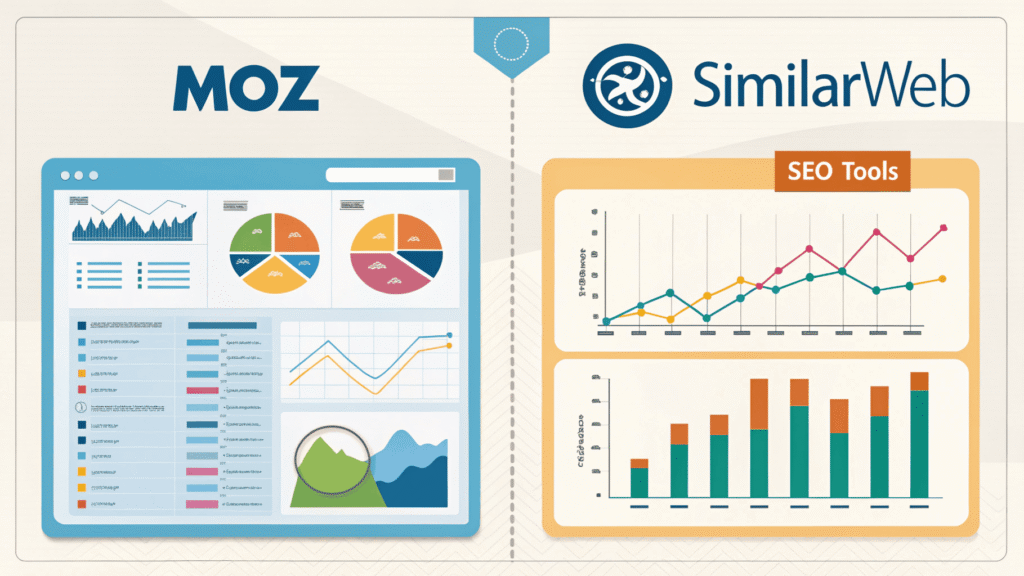
In the ever-evolving world of digital marketing, having the right tools at your disposal can make all the difference. When it comes to SEO, two names often rise to the top: Moz vs Similarweb. Both platforms promise to enhance your online visibility and improve your website’s performance, but which one truly delivers on that promise? Whether you’re a seasoned marketer or just starting out, choosing between these powerful SEO tools can be overwhelming. This guide will dive deep into what makes each tool unique and help you determine which fits best with your goals and strategies. Get ready for an insightful comparison that could shape your path to success in search engine optimization!
A Brief Overview of Moz and Similarweb
Moz and Similarweb are two powerful players in the SEO tools landscape. Each offers distinct capabilities that cater to different aspects of online marketing.
Moz, founded in 2004, is renowned for its comprehensive suite focused on improving organic search rankings. Its features include keyword research, link building tools, and site audits designed to enhance visibility.
On the other hand, Similarweb excels in providing competitive insights. It offers detailed traffic analysis and market intelligence by tracking website performance across various digital channels.
Both platforms have their strengths—Moz shines in optimizing content for search engines while Similarweb provides a broader view of audience behavior and competitor strategies. Users often turn to one or the other based on specific needs within their SEO strategy.
Comparison of Features and Functionality
When comparing Moz vs Similarweb, the differences in features stand out. Moz excels with its robust keyword research tools. Users can find valuable insights into search volume and difficulty, helping to inform their content strategies.
On the other hand, Similarweb shines in traffic analytics. It provides a comprehensive overview of website performance metrics like traffic sources and user engagement statistics. This data is invaluable for businesses looking to understand their competitive landscape.
Moz also offers on-page optimization suggestions through its Site Audit feature. This helps users identify areas needing improvement for better rankings.
Meanwhile, Similarweb focuses heavily on market analysis, offering insights that help companies gauge industry trends effectively. Each tool serves distinct purposes based on specific SEO needs, making them powerful allies when leveraged correctly.
Ease of Use and User Experience
Moz and Similarweb offer distinct user experiences that cater to different needs. Moz is often praised for its intuitive interface. The dashboard is clean, making it easy for beginners to navigate through various features without feeling overwhelmed.
Users appreciate the clear visualizations of data, allowing them to grasp insights quickly. With a comprehensive help center available, support feels accessible when questions arise.
On the other hand, Similarweb presents a more analytical approach. Its interface is packed with in-depth metrics and competitive analysis tools but can be complex at first glance. Users may need some time to familiarize themselves with its layout.
Both platforms prioritize user experience but diverge in their approaches. For those who value simplicity, Moz might feel more approachable while Similarweb appeals to users seeking detailed analytics right off the bat.
Pricing Plans and Value for Money
When it comes to choosing between Moz vs Similarweb, pricing can significantly influence your decision.
Moz offers several tiers, catering to individuals and agencies alike. Their plans provide access to essential SEO tools like keyword research and site audits. For those on a tighter budget, the Standard plan is quite appealing.
On the other hand, Similarweb targets digital market intelligence with its own range of subscriptions. The deeper insights into web traffic may justify the costs for businesses focused on competitive analysis.
Both platforms present value in their unique ways. Moz’s specific focus on SEO makes it a go-to for optimizing website performance. Meanwhile, Similarweb shines when understanding broader market trends.
It’s crucial to assess what features matter most for your goals before diving into either tool’s pricing structure.
Case Studies: Success Stories with Moz and Similarweb
Moz has transformed countless businesses’ SEO strategies. One notable case involved a mid-sized e-commerce store that struggled with low organic traffic. By utilizing Moz’s keyword explorer and site audit tools, the company pinpointed critical areas for improvement. Within six months, they saw a 150% increase in organic traffic.
On the other hand, Similarweb helped a SaaS startup identify untapped market opportunities. Using its competitive intelligence features, the team analyzed competitor performance and user engagement metrics. This insight led to targeted marketing campaigns that boosted their lead generation by 200%.
Both platforms demonstrate their unique strengths through real-world applications. Businesses have leveraged these tools to not only enhance visibility but also drive substantial growth in revenue and customer base.
Making the Choice: Which Tool is Right for You?
Choosing between Moz and Similarweb often comes down to your specific needs. If you’re focused primarily on SEO metrics, Moz might be your best bet. Its keyword research and link-building tools are well-regarded in the industry.
Conversely, if you need a broader view of web traffic sources and competitive analysis, Similarweb shines. It provides insights into website performance across various channels, which can be invaluable for digital marketing strategies.
Consider how each tool integrates into your workflow as well. Ease of use can significantly impact efficiency.
Think about your budget too; both platforms offer different pricing tiers that cater to varying business sizes.
Reflect on whether you prefer detailed reports or a more visual representation of data when making your choice. Each aspect plays a role in ensuring the tool aligns with your objectives.
Introduction to SEO Tools
SEO tools are essential for any digital marketer or business owner aiming to enhance their online presence. They provide crucial insights into website performance, keyword rankings, and competitor analysis.
With the right tools, you can identify areas needing improvement. This leads to increased traffic and better engagement with your audience. The landscape of SEO is constantly evolving, making these tools invaluable for staying ahead.
From tracking backlinks to analyzing content effectiveness, SEO tools offer a range of functionalities. Whether you’re a seasoned professional or just starting out, utilizing these resources can significantly impact your strategy.
Understanding which tool suits your needs best can be challenging. Each platform offers unique features tailored for different objectives in search engine optimization efforts.
Overview of Moz and Similarweb
Moz and Similarweb are two giants in the SEO tools arena, each offering distinct features tailored for digital marketers.
Moz, founded in 2004, focuses on improving organic search performance. Its suite includes keyword research tools, site audits, and backlink analysis. Moz’s intuitive interface is designed for both beginners and experts alike.
On the other hand, Similarweb harnesses web traffic data to provide insights into website performance across multiple dimensions. It excels at competitive analysis by showing how sites stack up against each other in various metrics.
While Moz emphasizes optimizing content for better rankings, Similarweb dives deeper into audience behavior and market trends. Both platforms cater to different needs but share a common goal: driving online visibility.
Key Features and Functions of Moz
Moz offers a suite of powerful tools designed to enhance your SEO strategy. The flagship feature, Moz Pro, provides comprehensive keyword research capabilities. Users can uncover valuable insights about search volume and keyword difficulty.
Another standout function is the Site Audit tool. This feature scans your website for issues that could hinder performance, offering actionable recommendations for improvement.
Link building is made easier with Moz’s Link Explorer, which allows users to analyze backlinks effectively. Understanding link profiles helps improve domain authority over time.
Additionally, Moz’s Rank Tracker keeps you updated on how well your keywords are performing in SERPs. It tracks movements and compares them against competitors.
The educational resources offered by Moz Academy empower users to deepen their SEO knowledge and skills—an invaluable asset for anyone looking to boost online visibility.
Key Features and Functions of Similarweb
Similarweb offers a robust suite of features tailored for digital marketers. Its powerful analytics provide insights into website traffic sources, user behavior, and engagement metrics.
One standout function is the competitive analysis tool. This allows users to compare their performance against competitors in real-time, helping identify opportunities for growth.
The platform also excels in industry benchmarking. Users can see how their website stacks up against market standards, gaining valuable context for strategic decisions.
Additionally, Similarweb’s keyword research capability enables marketers to discover high-traffic keywords and assess their potential impact on SEO efforts.
The intuitive dashboard simplifies data visualization, making it easy to interpret complex information quickly. With these tools at your disposal, you gain a clearer picture of the online landscape and actionable insights that drive success.
Pros and Cons of Using Moz for SEO
Moz offers a robust suite of tools that are well-regarded in the SEO community. Its keyword explorer is particularly powerful, providing insights into search volume and difficulty. This helps users identify opportunities for optimization effectively.
On the downside, some may find Moz’s interface slightly overwhelming at first glance. The variety of features can be daunting for beginners who are just getting started with SEO.
Another strength lies in its community support and educational resources. Users benefit from a vast library of guides and webinars that enhance their understanding of best practices.
However, the pricing can be a concern for small businesses or freelancers on tight budgets. While it provides value, there are cheaper alternatives available in the market.
The reporting capabilities are impressive but might require time to master fully. This learning curve could deter those looking for immediate results with minimal fuss.
Pros and Cons of Using Similarweb for SEO
Similarweb offers a wealth of data for anyone looking to enhance their SEO strategy. One of its biggest advantages is the depth of competitive insights it provides. Users can analyze competitors’ traffic sources, audience demographics, and engagement metrics, giving a comprehensive view of market trends.
However, the tool isn’t without drawbacks. Some users find that the accuracy of data can vary significantly between industries. This inconsistency may lead to misguided strategies if not cross-verified with other tools.
Another positive aspect is its user-friendly interface, which allows even beginners to navigate effortlessly. Yet, advanced features require familiarity and might overwhelm those new to SEO analytics.
Pricing could be another concern; while offering robust capabilities, it may not fit every budget especially for small businesses or startups seeking cost-effective solutions in an already crowded marketplace.
Head-to-Head Comparison: Moz vs Similarweb
When pitting Moz against Similarweb, both tools shine in different areas. Moz excels in keyword research and on-page optimization features. Users appreciate its intuitive interface for tracking rankings and backlinks.
On the other hand, Similarweb stands out with robust competitive analysis capabilities. Its traffic estimation feature provides a clear view of competitors’ performance across various channels.
While Moz offers extensive resources like guides and community support, Similarweb leans heavily on data visualization to present insights effectively. This can make it easier for users to grasp complex information at a glance.
Pricing also plays a significant role in decision-making. Moz has structured tiers based on features that cater well to small businesses and agencies alike, while Similarweb’s pricing is often seen as premium due to its expansive market intelligence offerings.
Your choice will depend on specific needs—whether you prioritize SEO fundamentals or desire comprehensive competitor insights.
Case Studies: Success Stories with Moz and Similarweb
Moz has transformed the SEO strategy for numerous businesses. For example, a growing e-commerce site utilized Moz to enhance its keyword rankings. By analyzing competitive insights and optimizing content, they tripled organic traffic within just six months.
On the other hand, Similarweb delivered impressive results for a tech startup looking to expand its online presence. They leveraged Similarweb’s traffic analysis features to identify high-potential referral sources. This approach led to a 150% increase in leads over three months.
Each tool offers unique benefits, catering to different aspects of digital marketing needs. Companies have witnessed significant growth by aligning their strategies with the right insights from these platforms.
The choice between Moz and Similarweb often hinges on specific business goals and requirements, showcasing how tailored approaches lead to success in diverse scenarios across industries.
Which Tool is Right for You? Considerations and Recommendations
Choosing between Moz vs Similarweb ultimately depends on your specific SEO needs. If you prioritize keyword research and on-page optimization, Moz might be the better option. Its user-friendly interface makes it easy to track your progress over time.
On the other hand, if competitive analysis is crucial for your strategy, Similarweb shines in this area. With its robust website traffic insights, you can understand where your competitors stand and how to outshine them.
Consider the size of your business as well. Small businesses may find Moz’s pricing more accessible while larger enterprises could benefit from Similarweb’s extensive data capabilities.
Think about what features matter most to you—be it backlink tracking or audience demographics. It’s essential to align these tools with your goals for effective results. Test both options through free trials when possible; hands-on experience often clarifies the best fit for individual requirements.
Conclusion
When it comes to choosing between Moz vs Similarweb, both tools bring unique strengths to the table. Moz shines with its robust keyword research capabilities and comprehensive link-building features, making it a favorite among those focused on on-page SEO strategies. On the other hand, Similarweb excels in competitive analysis, offering deep insights into website traffic sources and audience behavior.
Your decision should depend on your specific needs. If you’re looking for detailed metrics that assist in optimizing content and improving rankings over time, Moz might be your best bet. Conversely, if understanding market trends and competitor performance is crucial for your strategy, then Similarweb could provide the insights you need.

I am Ray Jones Digital
My current occupations: a Digital Marketer, Local SEO expert, Link Builder, and WordPress SEO specialist. Shopify SEO, Ecommerce Store Management, and HTML & WordPress Developer I have been practicing the above mentioned services for more than 10 years now As an SEO expert working with your ongoing projects.



